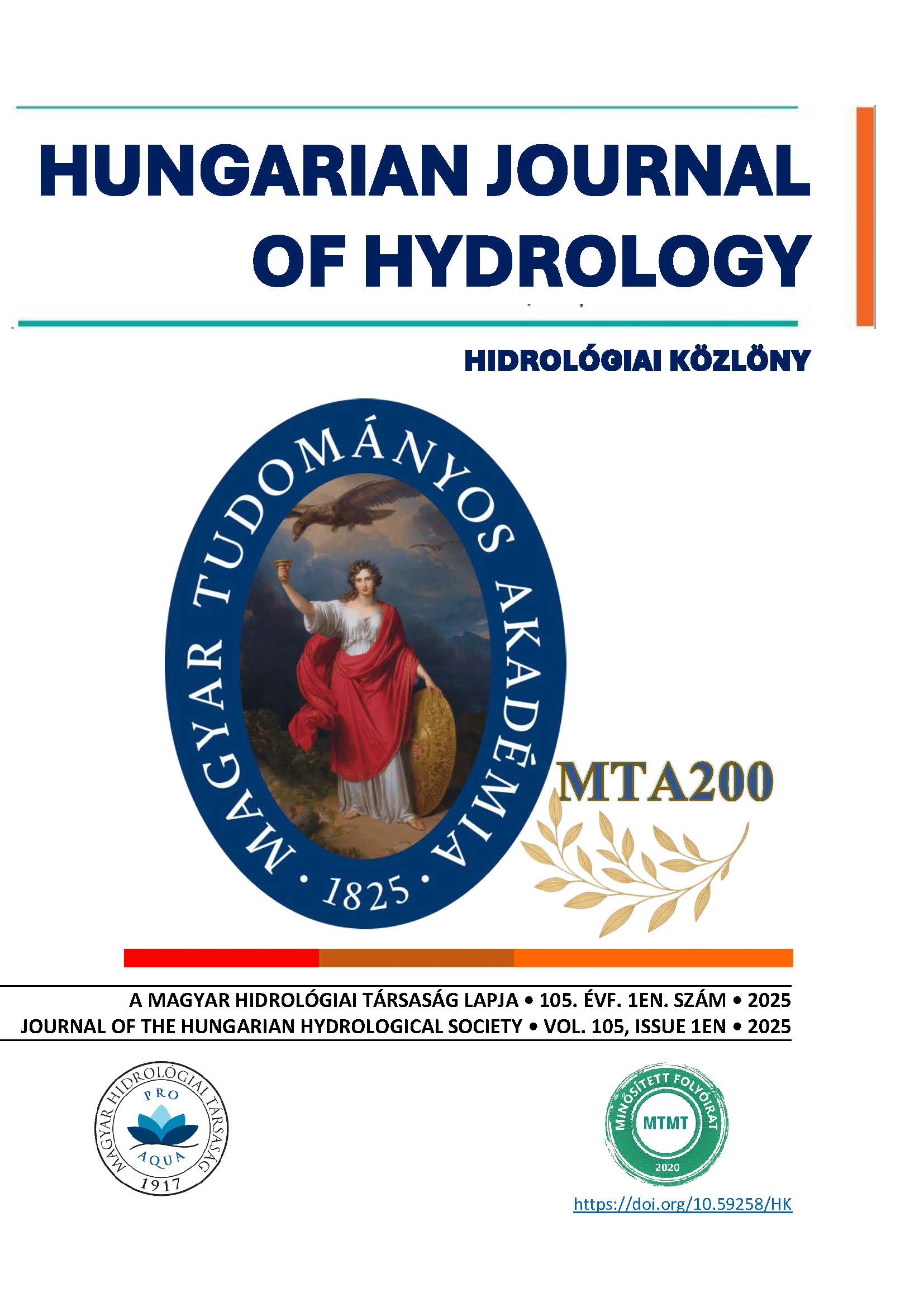Role of Bilateral MoUs in the Hungarian Water Diplomacy
Abstract
This paper explores the role of bilateral Memoranda of Understanding (MoU) in Hungary's water diplomacy, focusing on the creation of over 50 agreements signed in large numbers between 2013 and 2024. These MoU’s primarily aim to foster professional cooperation between Hungarian institutions, such as the General Directorate of Water Management, and their counterparts in various countries, in general those without shared water resources with Hungary. This is an original research, which delves into the historical context and motivations behind these agreements, highlighting their significance in promoting export and political relations rather than addressing the fragmentation of Hungary's water governance system, but touching upon that matter. While MoUs provide a flexible framework for cooperation without the binding obligations of formal treaties, they also present limitations, such as a lack of enforcement mechanisms and clear ownership, which can hinder effective implementation. The thesis suggests that for complex projects requiring clear obligations, formal treaties may be more appropriate. Future research directions include a detailed analysis of economic relations, educational and scientific collaborations, and a comparative study of similar programs in Europe. Overall, this work contributes to understanding Hungary's international water governance and diplomacy, emphasizing the need for better coordination among institutions involved in water management and clear definition of intended purpose when assigning resources.
References
Allen, T. (2003). IWRM/IWRAM: a new sanctioned discourse?
Baumgartner, T., Pahl-Wostl, C. (2013). Water and its Role in Global Water Governance. Ecology and Society, 18(3). https://doi.org/10.5751/es-05564-180303
Cziko, J. (2016): The Role of Water in International Relations – Water Diplomacy on the Rise
Csaba, T. (2024). Faculty of Public Governance and International Studies - University of Public Service, personal communication, 3rd April, 2024
Exim Bank (2024). https://exim.hu/exim/bemutatkozas (Download date: 03.04.2024)
Fleischer, T. (2013). Hungary in the centre of the Carpathian basin – some regional interrelations of sustainability.
Global Water Forum (2013). Water wars, maybe, but who is the enemy? (2013, April 10). https://www.globalwaterforum.org/2013/04/10/water-wars-maybe-but-who-is-the-enemy/ (Download date: 14.04.2024)
Grafton, R.Q., Biswas, A.K., Bosch, H.J., Fanaian, S., Gupta, J., Revi, A., Sami, N., Tortajada, C. (2023). Goals, progress and priorities from Mar del Plata in 1977 to New York in 2023. Nature Water, 1(3):230-240. https://doi.org/10.1038/s44221-023-00041-4
Hesham, E.E.. (2017). Carbon market. The future investment of sustainable development in developing countries: climate smart investment. Environmental Economics, 8(3):62-69. https://doi.org/10.21511/EE.08(3).2017.06
HEPA (2024). Magyar Exportfejlesztési Ügynökség https://hepa.hu/rolunk (Download date: 05.04.2024)
Horváth, D. (2024). Ministry of Foreign Affairs and Trade, personal communication 27th March, 2024
Horvath, P. (2024). Foreign trade attaché – Egypt, personal communication, 15th April, 2024
Hungarian Water Partnership (2024). https://www.hungarianwaterpartnership.hu/about-us (Download date: 04.04.2024)
Hungarian Water Technology Corporation (2024). About us. https://hunwatertech.com/index.php/en/about-us-en (Download date: 05.04.2024)
Tarrósy, I., Solymári, D. (2022). Relations with the Global South, solidarity and pragmatism in Hungarian foreign policy since the 1960s – a focus on Africa. Eastern Journal of European Studies, 13(1):106-122. https://doi.org/10.47743/ejes-2022-0105
Kardos, L. (2024). (foreign trade attaché – India, Sri Lanka, Bangladesh, Maldives), personal communication 26th April, 2024.
Kovács, P. (2024). Water Director Hungary, personal communication, 6th February, 2024
Kőrösi, Cs. (2023). Summary of proceedings by the General Assembly (https://digitallibrary.un.org/record/4012972/files/PGA77SummaryforWaterConference2023.pdf)
Major, V. (2024) Vice-president HWA, personal communication 22nd March, 2024
Ministry of Foreign Affairs and Foreign Trade (2017). National Export Strategy 2019-2030
Molly, Espey., Basman, Towfique. (2004). International bilateral water treaty formation. Water Resources Research, 40(5):0505-. https://doi.org/10.1029/2003WR002534
Nagyné Soós, I. (2024). (Ministry of Interior), personal communication, 19th February, 2024
National Water Strategy (2017). Kvassay Jenő Plan
Nováky, B., Bálint, G. (2013). Shifts and Modification of the Hydrological Regime Under Climate Change in Hungary. https://doi.org/10.5772/54768
The Observatory of Economic Complexity. (2024). ECI Rankings (HS96) https://oec.world/en/rankings/eci/hs6/hs96?tab=ranking (Download date: 15.04.2024)
Poast, P., Bommarito, M.J., Katz, D.M. (2010). The Electronic World Treaty Index: Collecting the Population of International Agreements in the 20th Century. Social Science Research Network, https://doi.org/10.2139/SSRN.2652760
Rózsa, B. (2024). Role of Bilateral Memoranda of Understanding in the International Cooperations of the Hungarian Water Diplomacy (Thesis on the National University of Public Service-Faculty of Water Sciences, Department of Water and Environmental Policy on the International Water Governance and Water Diplomacy program) p. 68.
Shishelina, L.Ny. (2022). The multi-vector nature of Hungary’s eastern policy. Научно-аналитический вестник Института Европы РАН, 25(1):35-43. https://doi.org/10.15211/vestnikieran120223543
Statista https://www.statista.com/statistics/269361/worldwide-renewable-water-resources (Download date: 2024.05.13)
Stipendium Hungaricum. About. https://stipendiumhungaricum.hu/about/ (Downloaded: 06.04.2024)
UNDP Country Insights. Human Development Reports. https://hdr.undp.org/data-center/country-insights#/ranks (Download date: 13.04.2024)
Wikimedia Foundation (2024). Áder János. https://hu.wikipedia.org/wiki/%C3%81der_J%C3%A1nos (Download date: 14.03.2024)
World Bank Open Data. https://data.worldbank.org/indicator/NY.GDP.PCAP.CD (Download date: 21.04.2024)
World Water Council (2013). Budapest Water Summit | World Water Council. (2013, October 9). https://www.worldwatercouncil.org/en/2013-budapest-water-summit (Download date 13.04,2024)
Copyright (c) 2025 Bálint Rózsa

This work is licensed under a Creative Commons Attribution-NonCommercial-ShareAlike 4.0 International License.




